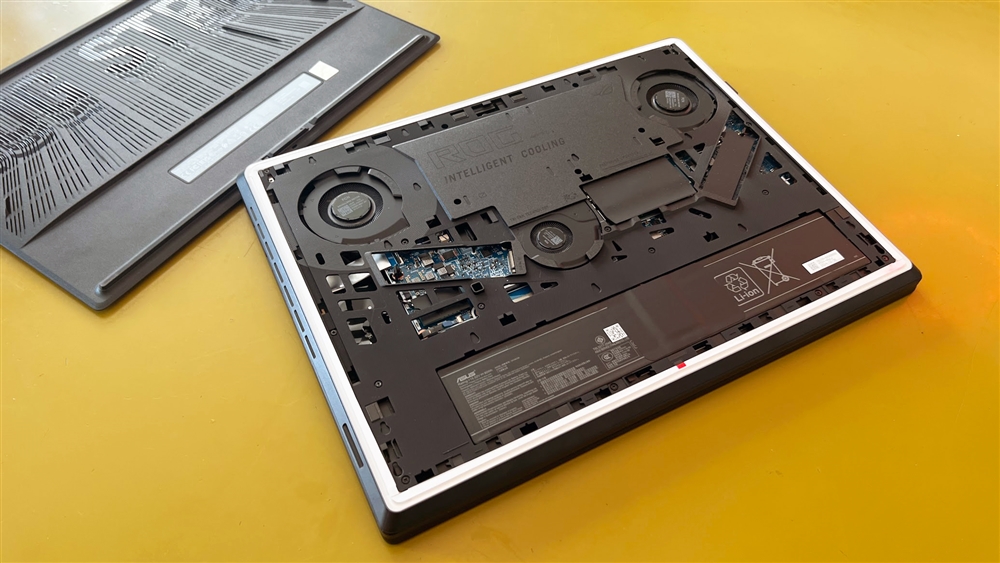Gaming Laptop vs. Desktop - Which Setup is Right for You?
Let's look at the facts of what today’s gaming laptops and desktops offer, and how PC gamers can choose the best option to build their ideal gaming computer setup.Buying Guides
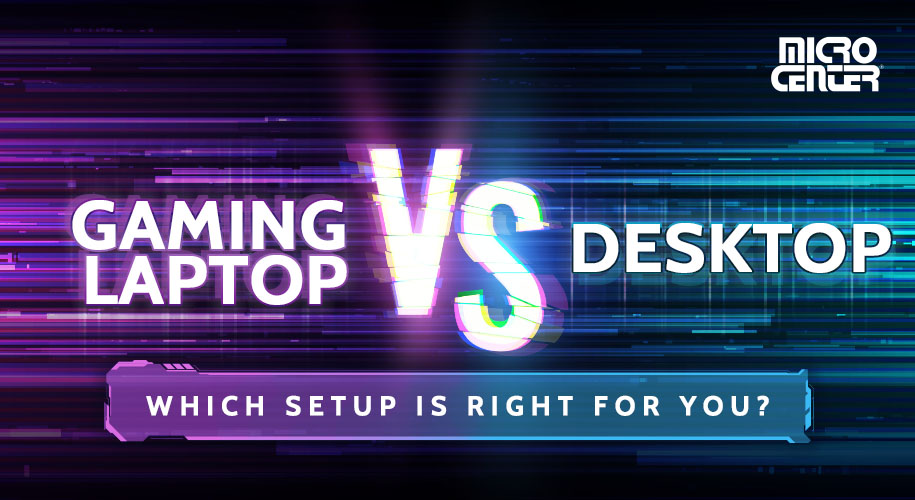
Choosing between a gaming laptop and a gaming desktop can be a genuinely tough call for today’s PC gamers. Although desktops were once the default choice for PC gaming, we’re now blessed to live in an age when powerful new gaming laptops hit the market frequently. With gaming desktop and laptop options both competitive, many gamers wonder if there’s a clear best choice between a gaming laptop vs. a gaming desktop.
Ultimately, the choice is like so many other debates in PC gaming: Strong opinions exist on both sides, but it all comes down to what you want from your gaming experience. Gaming laptops and desktops each have their own advantages and tradeoffs, so breaking down and comparing the differences is important for figuring out which fits your needs better.
Let’s look at the facts of what today’s gaming laptops and desktops offer, and how PC gamers can choose the best option to build their ideal gaming computer setup.
Core Questions for Gaming Laptops vs. Desktops
Start with some basic questions about what you want from your next gaming PC. These are some of the most important attributes that can determine whether a gaming laptop or desktop is the right choice for you:
- What’s your approximate budget for your gaming PC?
- How much power do you need from your PC? Do you want to run new triple-A titles at maximum detail settings, or are you looking for something more modest?
- Do you need a computer with a compact form factor, so you can take it on the go and/or use it in a small space such as a dorm room?
- Do you want the option to change and upgrade your PC’s parts?
- Will you use your PC for purposes other than gaming, such as working or creative pursuits?
- What kind of peripheral devices does your PC need to connect with?
For most gamers, the decision is a matter of weighing multiple factors and finding the model that offers the best combination. Here’s how some of the major factors play out between gaming laptops and desktops.
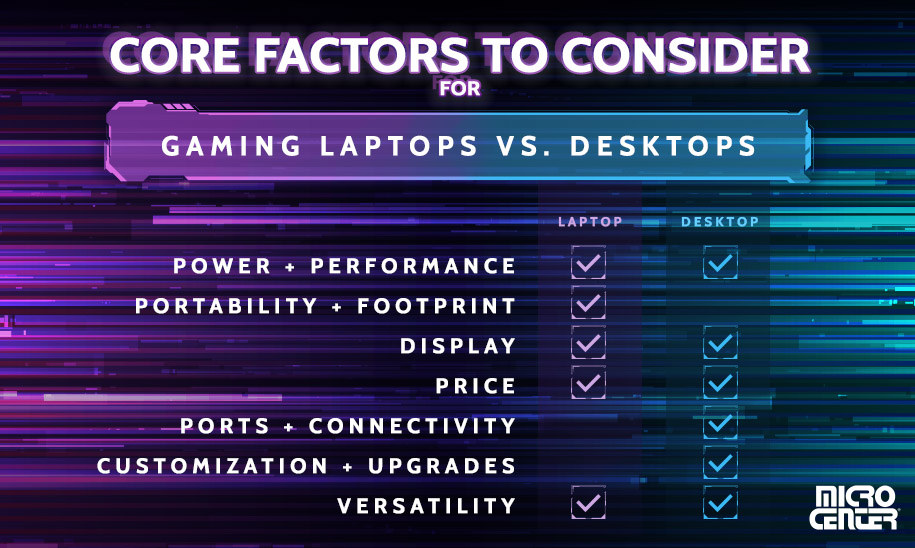
Power and Performance
Desktops still hold the edge when it comes to raw power. Larger components, higher wattage, and better airflow allow them to deliver stronger graphics, higher frame rates, and more multitasking capability than laptops. That said, today’s gaming laptops have closed much of the gap thanks to RTX 40/50-series GPUs and AI technologies like DLSS 3.5 and FSR 3, which offer smooth frame rates and sharp visuals in a portable package.
For gamers chasing the absolute highest performance, desktops remain the better choice. They can handle top-tier GPUs, support overclocking and liquid cooling, and provide headroom for future upgrades—advantages laptops rarely match despite their growing power.
Portability and Footprint
Obviously, a gaming laptop is far more portable than a desktop. Portability is pretty much the whole point of a laptop, and if that’s a big priority for you, a laptop offers on-the-go performance in a way that a desktop never can. This can be especially appealing if your gaming computer will also be your work or school laptop that you take to the office, to class, or to a coworking space.
Gaming laptops can also be a perfect choice for those seeking a rig with a smaller space footprint. If you’re gaming in a dorm room, a small apartment, or another location where every inch of space counts, a gaming laptop can save a ton of space by eliminating the need for a separate tower unit, monitor, and keyboard.
If your other needs are leading you toward a gaming desktop, but the space-saving qualities of a laptop still appeal to you, it’s worth looking into small form factor PCs. These compact PCs use micro-ATX and mini-ITX motherboards to pack more power into a smaller package, and they’re popular with college students and apartment residents.
Display
Both laptops and desktops deliver excellent display options. Modern gaming laptops commonly feature 1440p QHD as the sweet spot, with high-end models offering 4K OLED, fast refresh rates, and HDR. Desktops, however, pair more easily with top-tier GPUs and multi-monitor setups, making them better suited for VR, AR, and cutting-edge visuals.
Laptops lock you to the built-in screen, though many gamers connect to an external monitor through USB-C or HDMI when at home. Desktops, on the other hand, are built for easy monitor upgrades, whether you want higher refresh rates or a jump to 4K, giving you more long-term flexibility.
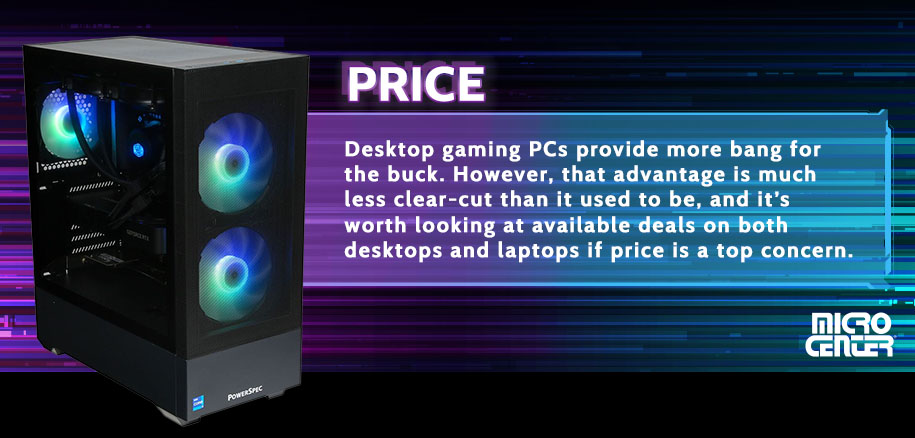
Price
Gaming laptops and desktops often start around $1,000–$1,500, with most models falling between $1,500 and $2,500, and high-end systems climbing past $3,000. Desktops usually deliver more performance for the price, since laptops factor in design and portability costs.
Laptops, however, include built-in peripherals like a display and keyboard, while desktop users must buy those separately—often adding $300 or more. Still, desktops offer greater flexibility and value overall, though deals on both types can shift the equation.
Ports and Connectivity
Both desktops and laptops need the right ports for peripherals, but desktops generally offer more flexibility. Larger motherboards allow for diverse configurations like Thunderbolt 5, multiple M.2 slots, and dedicated audio outputs—ideal if you need multi-monitor setups or specialty connections.
Laptops, constrained by size, usually provide fewer ports but still cover the essentials: HDMI 2.1 for high-refresh displays, several USB-A and USB-C/USB4 connectors, and sometimes Ethernet alongside fast Wi-Fi 7. Since layouts vary widely, it’s worth checking whether a model supports what you need, such as docking, VR headsets, or multiple monitors.
Customization and Upgrades
Desktops offer far more upgrade options than laptops, extending their lifespan and letting you swap parts like GPUs or cooling systems as technology advances. Most gaming laptops, by contrast, allow only limited upgrades such as RAM or storage, and some models lock even those components to the motherboard.
Modular designs with swappable GPUs are starting to appear but remain rare. For now, desktops are still the best choice if long-term customization and flexibility are priorities.
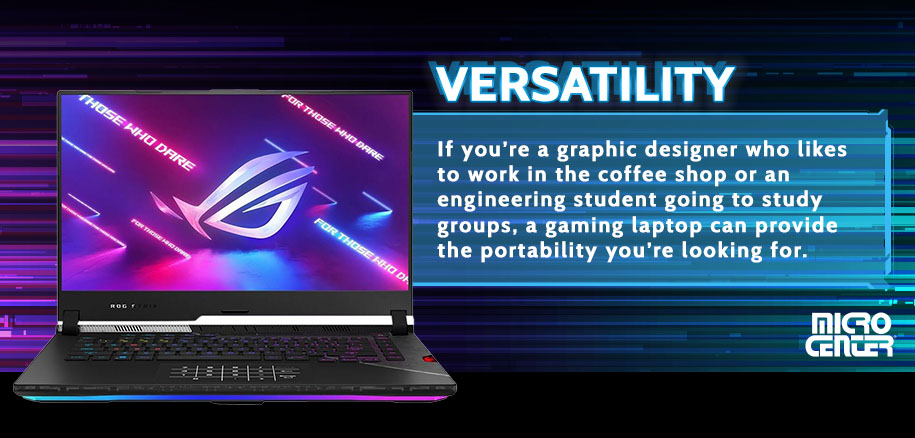
Versatility
Your gaming PC can also be a tool for your professional and creative life. Because gaming computers come with beefier specs than your average machine, many gamers also use them to run demanding software. So, if you’re looking for a computer that runs Final Cut Pro as well as it runs Elden Ring, it’s important to consider how the desktop vs. laptop question can affect you.
Ultimately, it’s all about your workflow and personal preferences. If you’re a graphic designer who likes to work on projects in the coffee shop or an engineering student who needs a portable CAD solution they can bring to study groups, a gaming laptop can provide the portability you’re looking for. On the other hand, if the computer you use for gaming and music production will never leave your studio, a desktop can allow you to stretch your dollar more.
Cloud Gaming
Another factor to consider in today’s gaming landscape is the rise of cloud gaming services like NVIDIA GeForce NOW, Xbox Game Pass Ultimate, and Amazon Luna. These platforms stream games directly from powerful remote servers, meaning your local hardware matters less than your internet connection.
For some gamers, this levels the playing field between laptops and desktops since even a mid-tier system can deliver high-end visuals through the cloud. Laptops especially benefit here, offering portability while tapping into server-grade GPUs.
Cloud gaming is improving quickly, but it’s not yet a replacement for local hardware if you play competitive titles where low latency and maximum consistency matter. Desktops and laptops still provide the most reliable performance, while cloud services are best viewed as a supplement for casual play or expanding your game library.

Finding Your Perfect Gaming PC
Whichever option you’re leaning toward, it’s a good idea to explore the huge range of choices available to you in both laptop and desktop models. There’s something out there for every PC gamer’s needs, and a little bit of time and research will allow you to find the model that hits the right combination of features.
Comment on This Post
See More Blog Categories
Recent Posts
Workstation vs. Laptop: Which is Best for your Small Business?
To help you determine whether a workstation or a laptop is the best choice for your business's needs, consider the factors we'll discuss below.
Continue Reading About Workstation vs. Laptop: Which is Best for your Small Business?




